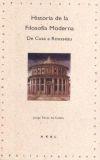This book covers much of the History of Modern Philosophy, from the birth of Nicolas de Cusa to the death of Rousseau. It examines, therefore, the broad period between the emergence of Renaissance philosophical currents to the full maturity of the Enlightenment tradition, paying due attention to philosophical movements traditionally known as "empiricism" and "rationalism." The work, which uses different exposure procedures, always giving priority to the narrative thread, not only emphasizes figures that, as in the case of Nicolas de Cusa, have not been sufficiently received in Spanish historiography, but also presents other more Fortunate (Descartes, Locke) in a novel way. Finally, the work brings a considerable amount of information, highlighting the relationship that philosophy holds with other aspects of contemporary culture.
All book titles by this author
|
Title |
Price | ||
|---|---|---|---|
|
|
Historia de la filosofía moderna. De Cusa a Rousseau Author: Jorge Pérez de Tudela Publisher: Akal |
$770.00
20%$616.00 |
Shopping cart
Loading cart
Important notices
|
|
Revista Filosofía & Co. nº 9 Nueva revista de filosofia divulgativa y actualidad |
|
|
"Espacios de la filosofía" - Mauricio Beuchot - Novedad Herder México |
|
|
Revista Filosofía & Co. nº 8 Nueva revista de filosofia divulgativa y actualidad |
|
|
Diván paisaje adentro Novedad Herder México |
|
|
Hechos de tiempo Novedad Herder |
Pay safely with:


In the webshop
New
|
|
Casa de las muñecas 67461 $280.00 -0.00% $280.00 |
|
|
Elogio del riesgo 61955 $430.00 -0.00% $430.00 |
|
|
Potencia de la dulzura 61957 $390.00 -0.00% $390.00 |
|
|
Seminarios II 67715 $400.00 -20.00% $320.00 |
|
|
Aliens y anorexia 68036 $390.00 -0.00% $390.00 |
In the press
Promotions
|
|
Panorama B1.2 Curso 46507 $235.00 -35.00% $152.75 |
|
|
Panorama B1 Ejercicios 47046 $475.00 -35.00% $308.75 |
|
|
Panorama A1 Ejercicios. Ubungsbuch 39886 $395.00 -37.00% $248.85 |
|
|
La retórica del Romanticismo 67816 $1,070.00 -35.00% $695.50 |
|
|
La invención del racismo 67822 $580.00 -35.00% $377.00 |








